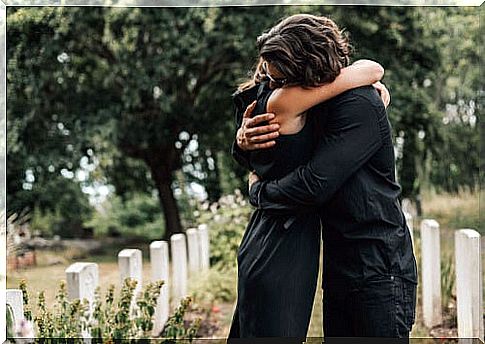Funeral Reflections

The deaths, mainly of people who make up our loved environment (friends, family, co-workers, etc.), put us in front of us, facing the pain of loss and anguish as a great “healing emotion” of the wound that let us.
But, at the same time, in the spaces where people who have died are watched, the most varied reflections about life are elucidated. I call them funeral reflections.

Death
We were not born prepared for life, so much less are we prepared for death. There are different conceptions about it, from the positions that understand life as a transition towards death and, in reality, it is lived when we die to those more materialistic who understand that life is this and when we die everything is over.
Man is the only living being who is aware of death and, therefore, is afraid of its appearance. However, the human being is born without awareness of his future death, which thrives as he grows: gradual biological decline and degradation seems to accompany the cognitive process of realizing that life is finite: being born, growing, developing, reproducing , decline and die.
Experiencing feelings of death is a totally subjective fact. There are people who experience losses in a tragic way and there are those who maintain an almost stoic temper.
These reactions depend not only on the attribution given to death and the person who died, but also on the degree of emotional expressiveness that the person possesses. There are people who defend themselves or block themselves when expressing how they feel, while there are others who are freer to allow themselves to cry and express their anguish in a more stark way.
Finiteness and transcendence are concepts that go together. Transcending implies enduring after death, that is, leaving a mark that is manifested in subsequent generations. Not only material values but those philosophical, affective, experience and learning are transmitted and give a certain sense of immortality to the deceased person.
However, transcendence has a certain intensity that can wane as time passes. And that is true death, since for a time and according to the legacy that the deceased person has left, it survives in the memories. Then it will slowly die in people’s memory, in the memory of family and friends, until gradually it disappears completely.

Accept the loss
The loss is followed by a period of mourning and grief, a grieving process that can last for months or in pathological cases never end. In this sense, there are no time patterns, since grief will depend on a multiplicity of factors, from the possibility of expressing emotions, having managed to say goodbye to the person, closing the bond and accepting death or the level of denial about the same, among others.
There is a directly proportional relationship between these factors and the time of mourning: the greater the expressiveness, acceptance and farewell, the faster the surviving person will recover and leave the mourning situation. The greater denial, resistance to saying goodbye and expressing emotions, the longer the period of mourning will be.
Accepting the loss implies that on the eve of death, explicitly or implicitly, a full farewell is achieved in which everything that the dying person leaves in life can be manifested. This emptying implies letting go of the person. It implies not only liberating it, but the liberation itself from the egoism of affective possession. This disengagement suggests entering a new door in the relationship.
Much of this acceptance has to do with the type of death. There are deaths that are surprising and deaths that are the product of a long process of deterioration.
In this type of unforeseen deaths, the relatives, mainly, cannot understand what happened. They ask themselves again and again why and try to give an answer to a situation that has no explanation and that even if it did, it would not be enough to alleviate the pain. People do not accept and are not aware of what happened: “but … if he was fine”, “he had a health that was like an oak tree”, “Why us?” …
Opposing situations and sensations are glimpsed in those deaths that are the result of a long disease process.
- Terminal or neurological diseases, among others, make the person go through successive hospitalizations, going to and from clinics, visits to doctors and endless treatments that feed the life expectancy of the patient and his family.
- The sick person is gradually consumed and in the same way his affective environment that, on the one hand, wishes that the ordeal of the protagonist and his own end through the death that gives peace to all.
Regardless of death, the truth is that the loss of a loved one is one of the most stressful events in life.
Reflections on funeral times
Funeral times have been significantly reduced since they are no longer the 12-hour marathons with a pilgrimage of people saying goodbye and greeting the relatives, between coffee and philosophical conversations about life: “we are nothing”, “I spoke yesterday with him ”,“ incredible! ”,“ Osvaldito was a capo ”,“ but he was such a sporty ”,“ always so measured in the meals that he served him ”,“ poor Aida, he was always stressed by every nonsense ”,“ we have to change ”,“ you can’t live like this… ”.
Express death without a wake and with cremation has annulled one of the most reflective moments that human beings have, since, paradoxically, when we speak the most about life is in death situations, as in a funeral.

There we become aware of the importance of life and how much we should value it. It is as if we make a momentary semicolon and share the things that we put aside or postpone and to which we should give prominence.
At a funeral, we talk about the importance of affection, family, friends, warm embraces, people who love us and who are unconditionally by our side and to whom, on a day-to-day basis, we do not give the place. What they deserve.
We say that we have to calm down and live more calmly because, sometimes, we create problems because of stupid things (of course, next to death, all things acquire the status of stupidity). That we should have a life in which we enjoy more and work less, that we can laugh and not impose a stereotypical moodiness on our faces.
We also say that we have to quit smoking (and more so when the person died of cancer), we dent the Marlboro package and we make a firm promise to give up the habit. We look at our prominent abdomen and we swear that we are going to walk 40 minutes a day and that we will also eat a healthy diet.
Sadly, these thoughts last as long as a breath lasts. When we leave the wake or the funeral ends, we get into the car, we accelerate more than usual because we are in a hurry to get to work, and at the first intersection the bus driver, an arrogant big man, drives his vehicle through us and makes him let’s insult outrageously.
Almost on the brink of attack, we continue our journey when we see the physical makeup of the driver, because we have a rapture of sanity and we do not want to go to intensive care at the nearest hospital …
Anxiety generates that we immediately rescue a cigarette stored in the glove compartment and we smoke it desperately as a prisoner in a prison. Then upset, when we get to work, we fight with someone from the office and in the midst of anxiety and tension, at noon we eat a Milanese with French fries: a fry with poor quality cholesterol oil!
Funeral reflections. I always recommend to patients that these reflections last and fundamentally that it is not necessary for someone to die to change our way of looking at the world and our life in it. Express reflection is not the problem…. the problem is to carry it out.









